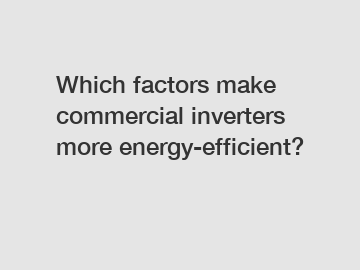Jan. 07, 2024
Energy
Senergy supply professional and honest service.
Commercial inverters play a crucial role in converting direct current (DC) from solar panels into alternating current (AC) for the electrical grid. As the demand for renewable energy grows, the efficiency of these inverters becomes an important consideration. Energy-efficient commercial inverters not only help maximize the power output but also reduce operational costs and environmental impacts. In this article, we will discuss the key factors that contribute to the energy efficiency of commercial inverters.
1. Conversion Efficiency:

The conversion efficiency of a commercial inverter is a primary factor in determining its energy efficiency. This parameter indicates how effectively the inverter converts DC electricity from solar panels to usable AC electricity. A higher conversion efficiency means less energy is wasted in the conversion process, resulting in more electricity being fed into the grid. Modern commercial inverters often have conversion efficiencies of 95% or higher, ensuring minimal losses during power transmission.
2. Maximum Power Point Tracking (MPPT):
MPPT technology is another important factor that boosts the energy efficiency of commercial inverters. Solar panels generate different amounts of electricity based on various factors such as shading, temperature, and orientation. MPPT algorithms enable the inverter to constantly track and adjust to the optimal power point of the solar panel, maximizing energy harvest. This technology ensures that the inverter operates at the highest possible efficiency, even under varying conditions, thereby increasing overall energy production.
3. Cooling Mechanisms:
Commercial inverters generate heat during the conversion process, which can impact their performance and lifespan. Efficient cooling mechanisms are crucial in maintaining optimal temperatures and preventing overheating. Advanced cooling techniques, such as active cooling with fans or liquid cooling systems, help dissipate heat effectively, allowing the inverter to operate at higher capacities and enhancing its energy efficiency. By maintaining lower operating temperatures, commercial inverters can achieve higher conversion efficiency and prolong their lifespan.
Suggested reading:4. Power Factor:
Power factor is a measure of how effectively electrical power is utilized in a system. In commercial applications, a high power factor is desirable as it minimizes reactive power and reduces system losses. Power factor correction (PFC) technology in commercial inverters helps maintain a unity power factor by aligning the phase of current and voltage, optimizing power transmission. Inverters with PFC technology ensure that a greater percentage of the electricity generated by solar panels is utilized efficiently, resulting in increased energy efficiency.
5. Monitoring and Control Systems:
Intelligent monitoring and control systems can significantly impact the energy efficiency of commercial inverters. Real-time data gathering and analysis enable system operators to identify any inefficiencies or anomalies promptly. By identifying and rectifying issues quickly, energy losses are minimized, and the overall system performance improves. Additionally, remote monitoring capabilities allow for efficient maintenance and troubleshooting, reducing downtime and maximizing energy production.
In conclusion, several key factors contribute to the energy efficiency of commercial inverters. Conversion efficiency, maximum power point tracking, cooling mechanisms, power factor correction, and monitoring systems play vital roles in optimizing energy production and minimizing losses. By investing in energy-efficient commercial inverters, businesses can reduce operational costs, increase renewable energy generation, and lessen their environmental impact.
To learn more about energy-efficient commercial inverters or discuss your renewable energy needs, please contact us. Our team of experts is here to assist you in finding the most suitable solutions for your commercial energy requirements.
Contact us to discuss your requirements of inverter for 3 phase home. Our experienced sales team can help you identify the options that best suit your needs.
Suggested reading:Related Articles
If you are interested in sending in a Guest Blogger Submission,welcome to write for us!
All Comments ( 0 )